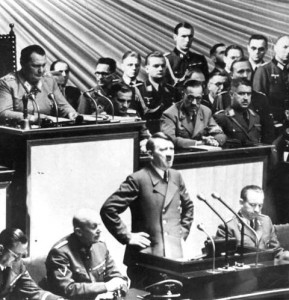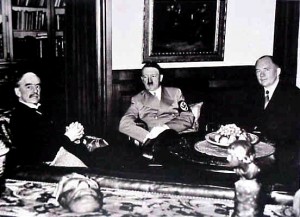This is something you ought to know:
each time we must choose between
Europe and the open sea,
we shall always choose the open sea.
Winston Churchill[1]
A reverse on the Continent had been enough
to make Great Britain desire to absorb herself
in her own defence.
Charles de Gaulle[2]
On Oct. 6, 1939, two weeks after the fall of Warsaw and the end of the Polish campaign, Hitler spoke in the Reichstag:
My chief endeavor has been to rid our relations with France of all trace of ill will and render them tolerable for both nations … Germany has no further claims against France … I have refused even to mention the problem of Alsace-Lorraine … I have always expressed to France my desire to bury forever our ancient enmity and bring together these two nations, both of which have such glorious pasts …
I have devoted no less effort to the achievement of Anglo-German understanding, nay, more than that, of an Anglo-German friendship. At no time and in no place have I ever acted contrary to British interests … I believe even today that there can only be real peace in Europe and throughout the world if Germany and England come to an understanding. (William Shirer. The Rise and Fall of the Third Reich, p. 576)
Reading the transcript of Hitler’s address, one might be forgiven for assuming that these must be the sentiments of the greatest peacemaker of any era or nation, not a speech by the biggest criminal in the history of mankind. During his political career the Führer spoke often and at length about peace, all the while preparing for war. But there was something special about this speech. It was as if he were speaking to unseen associates in London and Paris, trying to sway them by explaining his position once again, and attempting to influence their decision, although there is little doubt that he already knew what that was.
 What was Hitler’s goal? To vindicate himself before future generations? To parade his fictitious desire for peace before the German nation, so that later it would be easier to hurl his people into the crucible of the most terrible war? Possibly. But it seems to me that the target audience for this speech consisted of a few dozen people who were shaping Britain’s political policy, and with it – the future events of history.
What was Hitler’s goal? To vindicate himself before future generations? To parade his fictitious desire for peace before the German nation, so that later it would be easier to hurl his people into the crucible of the most terrible war? Possibly. But it seems to me that the target audience for this speech consisted of a few dozen people who were shaping Britain’s political policy, and with it – the future events of history.
Why should this war in the West be fought? For restoration of Poland? Poland of the Versailles Treaty will never rise again … The question of re-establishment of the Polish State is a problem which will not be solved by war in the West but exclusively by Russia and Germany … It would be senseless to annihilate millions of men and to destroy property worth millions in order to reconstruct a State which at its very birth was termed an abortion by all those not of Polish extraction.
What other reason exists?…
If this war is really to be waged only in order to give Germany a new regime … then millions of human lives will be sacrificed in vain … No, this war in the West cannot settle any problems … (ibid., 641)
“At no time and in no place have I ever acted contrary to British interests,” claims Hitler. What strange words … What was he trying to rationalize before those who had declared war on his country? “German interests are not contrary to British interests” is what he should have said. With one “but” – only if Adolf Hitler had assumed power on his own in his own country, and no one other than German industrialists had had a hand in his career. But we have already shown how England, France, and the US played a role in the establishment of the Nazi regime. Thus Adolf Hitler was justifying before his British sponsors the fact that he was cutting himself loose from their control and going off the “leash.” And he was trying to impress upon them one important point: despite what had occurred, he was not encroaching on their empire and wanted only to engage with them as an equal. Hence his comments about how the West does not need a war.
But Hitler’s speech was not a call for peace. It was an attempt to jolt the British and French out of their obstinate unwillingness to make Germany their equal partner on the international political stage. Their differences came down to something very simple: Hitler wanted to first ensure that he received equal treatment, and only then would he be ready to strike at Russia, whom he had always hated. But the Western leaders refused to seat the Germans alongside them at the table until Berlin had fulfilled its duty to crush Russia/the USSR. They were demanding that Hitler withdraw German troops from Polish territory and restore the Polish state. For what purpose? In order to achieve the long-standing goal of Western policy, which was to provoke a conflict between Germany and Russia. After all, Stalin was unlikely to agree to simply return the land that had been ceded to the Soviet Union under the Soviet-German non-aggression pact. The conditions for the “restoration of Poland” sounded good, but in fact had nothing to do with peace on the European continent, but rather the replacement of one “strange” war with another, more “correct” one.
The thoughts that Hitler voiced from the lectern of the Reichstag on Oct. 6, 1939 had already been relayed to the leaders of the UK and the US through confidential channels. On Sept. 26, 1939, Hitler personally instructed Göring that it was necessary to communicate those ideas to London via a Swedish intermediary, Birger Dahlerus. At the same time, the Führer was using an American oil magnate, William Rhodes Davis, to convey his proposals to President Roosevelt. So Hitler’s peace proposals were intended to fall upon very “fertile” soil. Which means there was a good chance that the German leader would see the West change its position and agree to discuss the prerequisites for Germany to join the existing Anglo-Saxon world order. This was why Adolf Hitler’s speech sounded peaceful enough to have done credit to any prominent “activist for world peace.” The next day, vivid headlines were splashed across the front page of every German newspaper: “Germany’s Will for Peace”, “No War Aims Against France and England – No More Revision Claims Except Colonies”? “Reduction of Armaments” (ibid., 642)

Munich Conference, 1938
Now, the governments of Britain and France could, from the Führer’s point of view, lend a hand to the Third Reich without losing face. After all, it was not they who had asked for peace, but Germany herself. So Hitler’s peace overtures to the West were quite likely meant very seriously. But with the intention of later transforming them into a war with the East. But the Führer’s initiatives went unanswered. Or rather – the answer was no. The next day, Oct. 7, 1939, the French prime minister, Édouard Daladier, told Hitler that France would not lay down her arms until guarantees for a “real peace and general security” were obtained (ibid., 643). On Oct. 12, 1939, British Prime Minister Neville Chamberlain, called Hitler’s proposals “vague and uncertain.” But what the Englishman went on to say should not be misunderstood. The British leader stated that if Germany wanted peace, “acts – not words alone – must be forthcoming.” Hitler needed to show London “convincing proof” that he really wanted peace, i.e., he needed to attack the USSR.
What was Adolf Hitler to do? He had offered peace and it had been rejected. All that was left was to prepare to fight. So, he waited three days, then gave his order – to develop a plan to wipe out the enemy that lay closest at hand – France.
We’ll never know what it was Adolf Hitler really wanted or how serious were his intentions to decimate the French. But looking at certain facts, we can discern that his main idea was still to negotiate with the West. What are those facts? For example, if Hitler had really wanted to fight London and Paris, he should not have prevented German sailors from carrying out what should have been an unambiguous assignment – to sink enemy ships. But the German navy began fighting so heroically that the Führer had to quickly intervene in order to rein in his excessively zealous captains. During the first week of the war the Germans sank 11 ships, totaling 64,595 tons. If that had continued, soon only German submarines would have been left gliding around the British Isles. But then a real miracle happened: the tonnage of English ships that were sunk in the second week of the war amounted to only 51,561, then another 12,750 tons in the third week and only 4,646 tons in the fourth (ibid., 635).
What led to such a sharp decline in the effectiveness of the German submarines? Perhaps the British learned how to sink them? Or were the captains of the British ships becoming more cautious and experienced? No, the British sailors themselves were surprised by these numbers. But it’s not hard to figure out how this “miracle” occurred. Hitler asked his naval commanders not to sink English and French ships! German Admiral Erich Raeder noted in his diary that the general policy was in essence “to exercise restraint until the political situation in the West has become clearer” (ibid., 636). There was a well-known incident in which a German submarine captain requested permission to attack a French warship, the Dunkerque, which was in a vulnerable position, but he was refused.[3] The Führer personally forbade the attack!
The story of Hitler’s attack on France seems equally improbable. Hitler first scheduled the offensive for Nov. 12, 1939,[4] but it actually took place on May 10, 1940. During that period Hitler postponed the offensive 20 times![5] (It is interesting that the first delay in the offensive occurred after the preemptive “assassination” attempt on Hitler’s life, orchestrated by British secret agents on Nov. 8, 1939 in the Bürgerbräukeller beer hall in Munich.)
How did the British and French prepare to fend off his aggression? Sometimes it seemed as though right up until the very end they simply could not believe that the Führer would decide to make a move. Even as heated battles were underway in Norway between German and British forces, the British still kept their planes on the ground. Only a few aircraft flew out on raids – at first during the day, and then primarily at night. During those sorties British planes continued to drop countless propaganda leaflets intended for the German public. And this idyll lasted until May 1940, i.e., until the onset of the German offensive.

ORIENTAL REVIEW published exclusive translations of the chapters from Nikolay Starikov’s documentary research ““Who Made Hitler Attack Stalin” (St.Petersburg, 2008). The original text was adapted for translation by ORIENTAL REVIEW.
ENDNOTES:
[1] Charles de Gaulle, The Complete War Memoirs of Charles de Gaulle (New York: Carroll & Graf Publishers, 1998) 557.
[2] Ibid., 59.
[3] Albert Speer. Inside the Third Reich. Memoirs (New York: Simon & Schuster, 1997) 165.
[4] Franz Halder. The Halder War Diary, 1939-1942 (Novato, CA: Presidio Press, 1988) 672.
[5] Hans-Adolf Jacobsen, 1939–1945. Vtoraya Mirovaya Voina // Vtoraya Mirovaya Voina: Dva Vzglyada. 13.
PREVIOUS EPISODES
Episode 14. How Adolf Hitler turned to be a “defiant aggressor”
Episode 13. Why London presented Hitler with Vienna and Prague
Episode 12. Why did Britain and the United States have no desire to prevent WWII?
Episode 11. A Soviet Quarter Century (1930-1955)
Episode 10. Who Organised the Famine in the USSR in 1932-1933?
Episode 9. How the British “Liberated” Greece
Episode 7. Britain and France Planned to Assault Soviet Union in 1940
Episode 6. Leon Trotsky, Father of German Nazism
Episode 5. Who paid for World War II?
Episode 4. Who ignited First World War?
Episode 3. Assassination in Sarajevo














Pingback: The Unpleasant Truth About The 1941 Parachuting Of Rudolf Hess In England, Part 2 – Conspiracy News
Pingback: The Unpleasant Truth About The 1941 Parachuting Of Rudolf Hess In England, Part 2 - noticiasp
Pingback: The Unpleasant Truth About The 1941 Parachuting Of Rudolf Hess In England, Part 2 – The Trading Letter
Pingback: The Unpleasant Truth About The 1941 Parachuting Of Rudolf Hess In England | Réseau International (english)
Pingback: What Do The Winners In ………….The Unpleasant Truth About ………….Who Wants To Relaunch …………..The Surrender Of …………….They Knew Too Much – Nikos's bl
Pingback: The Unpleasant Truth About The 1941 Parachuting Of Rudolf Hess In England – Nikos's blog
Pingback: History of World War II: Adolf Hitler Was Not Planning to Go to War against Britain and France? – Niki´s Opinion Forum
There is no understanding of Nazism without understanding its OCCULT underpinnings. This is elementary and ignorance of that seminal motivic force in human affairs and historic political machinations is willful self-blinding. The fact that WWII led to the destruction of the Waffen SS ALONE is justification of any and all abuses, overt and covert committed by the Allies in their requirement of unconditional surrender. Today’s Reinhard Heydrichs are well hidden and for good reason. Make no mistake, the autonomous, self-evolving human spirit will reveal their bunkers and turn them to sewage. In the meantime, this book available on Amazon will place a big piece of the puzzle into its correct location
Prof. Dorothy Figueiras: “Aryans, Jews, Brahmins”.
Pingback: The unpleasant truth about the 1941 parachuting of Rudolf Hess in England – SYLVAIN LAFOREST